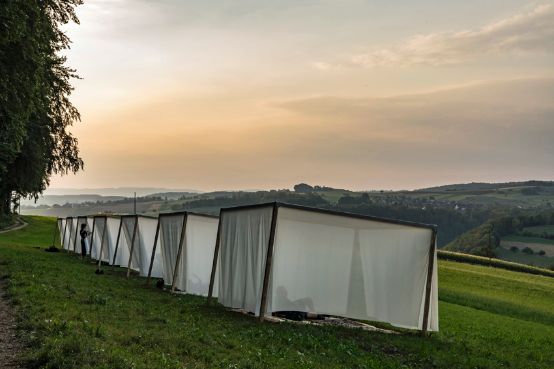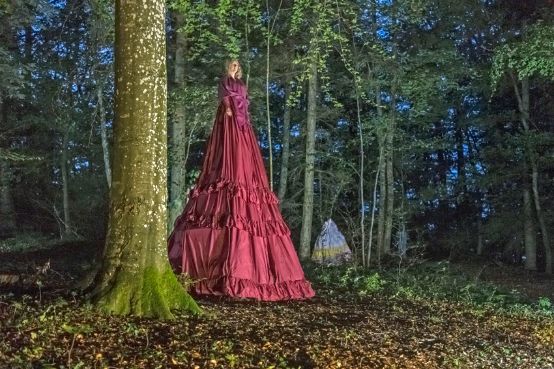Inside and outside
The Rümlingen Festival brings opera to the countryside. "In scene. 7 landscape operas" is this year's motto.

It is 14 square meters in size, this Tonhalle in miniature. Perhaps 20 people sit in it: four string players at the front of the stage, an estimated 16 in the audience. At the entrance to this beautifully put-together mini-concert hall, an actor moderates. He provides information about the "string quartet" with two violas, for example about the past of this "Henosode Quartet" in a student flat share. Between the mostly sparse sounds, the building is explained, which has special acoustics and a very special interior sound system. Then the performer Thomas Douglas repeatedly pulls the door open. He is annoyed by barking dogs or the seemingly endless ringing of the church bells of the village church in Rümlingen.
Art sometimes has a strange life of its own - this also applies to this Tonhalle project by Swiss composer and theater director Ruedi Häusermann. The disturbing environmental noises do not come from animals, churches or motorcycles, but from loudspeakers positioned around the Tonhalle. The theme is thus set. It's about inside and outside. Here the devoutly quiet concert hall, there the uncontrollable, sometimes annoying environment that intrudes into the sacred musical sphere. Häusermann makes the interplay amusing, but unfortunately too stretched out. The same or slightly varied gags come too often. What works at first becomes increasingly stale. It's a nice theme, just too long.
Opera farewell
Long is also the sound hike as part of this year's Rümlingen motto "In scene. 7 landscape operas". The nature-loving excursion takes three and a half hours with steep climbs and very different music stations. A giant soprano (Eva Nievergelt) in a red robe stands at an altitude of around 750 meters. She sings excerpts from opera arias, short episodes from Arnold Schönberg's Expectationfrom George Bizet's famous opera Carmen or from Benjamin Britten's Peter Grimes. The fragments last barely longer than 1 minute. They are accompanied by an accordionist who, hidden under Nievergelt's dress, plays sounds by Swiss composer Mischa Käser. It all sounds sparse, reduced, not exactly cheerful. The operatic swansong character is matched by the costumes scattered around the forest: worn-out clothes from an apparently bygone era with cassette recorders inside. They should sound lo-fi, the noisy recordings of operas from the last few centuries, says Mischa Käser. He has imagined the empty costumes as extinct opera singers, so to speak; what remains is the live singer as the last representative of a dying genre.
About 50 meters below Mischa Käser's whimsical but very successful opera fragments, the play In the forest by Manos Tsangaris. The main characters are a percussionist and a singer. First there are verbal and non-verbal musical dialogs between the two near the audience. Then the large forest space comes into play. The singer moves away and continues to sing, strolling through the forest. Figures scurry back and forth behind trees, timpanists stand ten to twenty meters away. Tsangaris is a multi-talent. He incorporates lighting effects, which unfortunately do not come into their own in bright light. Nevertheless, this forest scene also makes an impression.
-

- Photo: Kathrin Schulthess
- Eva Nievergelt as the last representative of a dying genre in Mischa Käser's opera fragments
Head concerts
No, it's not boring in Rümlingen. The festival not only offers space in the forest, but also freedom. Composers such as the young Italian Clara Ianotta enjoy the fact that they can experiment far away from predetermined concert formats, which are usually determined by instrumentation, duration and frontal presentation in front of a seated audience. The Rümlingen concept emphasizes above all the changed listening situation. Yes, it makes a big difference whether your body is involved, whether you are physically exhausted and can simply look at the mountains and clouds. The Austrian composer Peter Ablinger makes a special point of listening outdoors. Seven of his so-called "Bedouin tent cubes" stand at the edge of the forest. The sides of the square wooden frames are covered with fluttering white fabric sheets. Inside are carpets that give free rein to the imagination. Without art and operatic heaviness, you can simply gaze at the clouds, think of Gustav Mahler, Beethoven's Pastoral or - even if it is the Swiss forest - Richard Wagner's Forest weaving.








